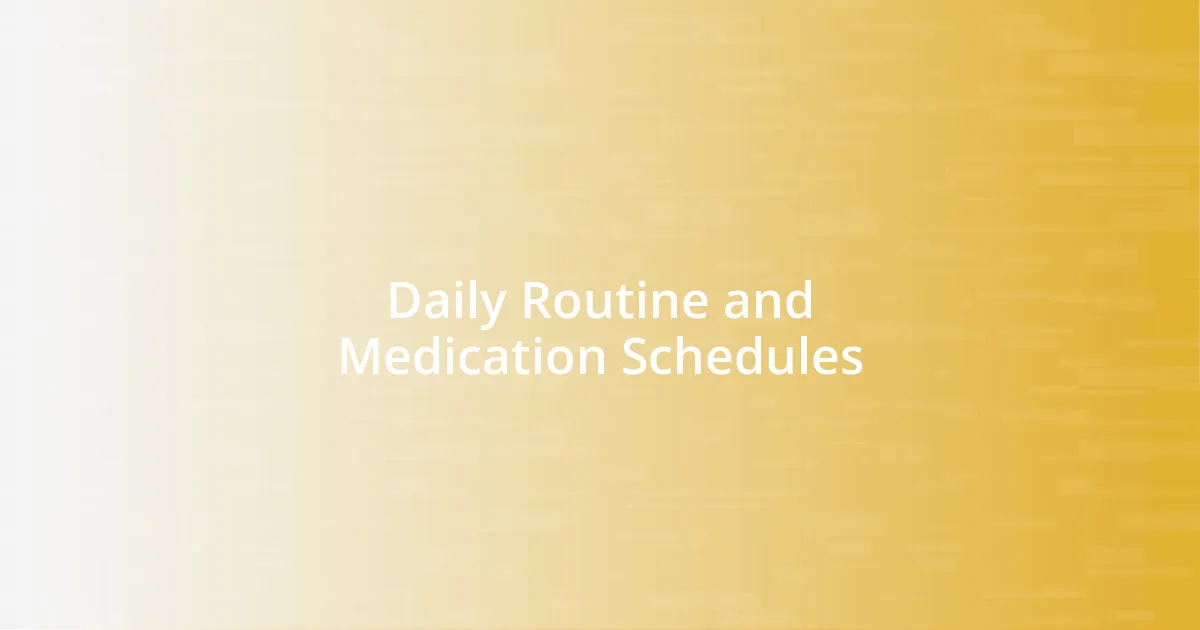Key takeaways:
- Timing doses significantly impacts medication efficacy and overall health outcomes.
- Factors like circadian rhythms, food interactions, and symptom patterns influence the optimal timing for taking medication.
- Creating a consistent medication routine, linked to daily activities, enhances adherence and effectiveness.
- Adjusting doses for specific conditions and personal routines can lead to noticeable improvements in health management.

Understanding the Importance of Timing
Timing is everything! I recall a time when I forgot to take my medication on schedule — the difference I felt throughout the day was just astonishing. It hit me that taking doses at the right moments isn’t just about following instructions; it’s about how those instructions truly impact our well-being. Have you ever forgotten a dose and felt that unsettling shift? It’s a reminder of how vital this simple act can be.
Also, I’ve learned that our bodies respond differently at various times during the day. For instance, I noticed that taking supplements in the morning gave me a distinct energy boost, whereas evening doses tended to disrupt my sleep. It’s fascinating to observe how my routine could enhance my health simply by tweaking the timing! Have you ever experimented with timing? The results might surprise you.
I’ve read studies emphasizing that certain medications’ efficacy can fluctuate based on time. This reinforced my belief that we need to listen to our bodies. The key isn’t just about taking the right dose, but also knowing when to take it. Isn’t it incredible how something so simple can profoundly influence our health outcomes? It certainly has changed the way I approach my own health management.

Factors Influencing Optimal Dosage Timing
When it comes to the timing of doses, several factors come into play. I remember adjusting my medication schedule to align with my meals, which significantly improved its absorption. It’s intriguing how our body’s natural rhythms, known as circadian rhythms, impact how we metabolize substances. For instance, I found that taking my blood pressure medication at night was more effective than in the morning, leading to a remarkable drop in my daily readings.
Here are some key factors that influence optimal dosage timing:
- Circadian Rhythms: Our internal clock affects drug metabolism; timing doses with these rhythms can enhance efficacy.
- Food Interaction: Some medications should be taken with food for better absorption, while others may require an empty stomach.
- Symptom Patterns: Timing doses when symptoms are at their peak can provide maximum relief; for example, taking allergy meds preemptively can prevent flare-ups.
- Lifestyle Factors: Sleep schedules, activity levels, and personal routines play a critical role; aligning medication times with these can improve adherence and effectiveness.
These insights have truly shaped my understanding of how a small adjustment can yield significant benefits. Each time I consider timing, I’m reminded of the intricate relationship between our habits and health.

Daily Routine and Medication Schedules
I’ve discovered that a consistent daily routine can make a substantial difference in medication adherence. For instance, I started setting reminders on my phone to take my doses around the same time each day. This little adjustment transformed my approach to taking medication—it became as habitual as brushing my teeth! Have you tried linking your doses to a daily activity? It might help create a smoother routine.
Moreover, I found that aligning certain doses with my activities made a noticeable impact on how I felt throughout the day. For example, I take my allergy medication right before breakfast, which has dramatically reduced my symptoms during morning outings. This simple tweak not only eases my symptoms but also enhances my enjoyment of the day. What activities do you find help you remember your medications?
Comparing different strategies for medication timing really highlights how personal and tailored our routines can be. Here’s a quick view of how various timing strategies stack up based on my experiences:
| Strategy | Benefits |
|---|---|
| Morning Routine | Boosts energy; enhances focus |
| Evening Routine | Improves sleep; reduces morning symptoms |
| Meal Timing | Better absorption; mitigates stomach upset |
| Activity-Based Timing | Creates a consistent habit; reduces forgetfulness |

Rest and Activity Timing Considerations
Timing doses in relation to rest and activity can profoundly affect how well the medication works for us. I’ve often noticed that my energy levels fluctuate throughout the day, which has led me to experiment with taking certain medications around my most active times. For instance, I began taking my pain reliever just before an evening workout. The result? I felt more invigorated during my exercise, not to mention more motivated to stay active!
It’s worth pondering how our rest patterns intertwine with medication timing. I recall a week when I neglected my usual wind-down routine, and my sleep medications didn’t seem to help at all. This experience made me realize that aligning my doses with a calming evening ritual not only aided relaxation but also improved my sleep quality substantially. Have you considered your rest habits in relation to your dosing schedule? It might unlock a new level of symptom management for you.
Moreover, I find that engaging in light activities before taking certain doses can set the right tone for the day. For example, a quick walk before breakfast helps me mentally prepare for taking my morning medications. It’s almost as if the movement primes my body to absorb the medication better. Have you ever noticed how your daily activities influence your health routines? Making a conscious effort to synchronize rest and activity with my medication schedule has undeniably enhanced my overall wellness journey.

Adjusting Doses for Different Conditions
Adjusting doses for different conditions is something I’ve learned to approach with care. For instance, when I was managing seasonal allergies, I realized that the time of day I took my medication mattered greatly. I switched to taking my antihistamines in the late afternoon instead of the morning, which significantly reduced my sneezing fits during my evening activities. Isn’t it interesting how a simple timing adjustment can yield such a noticeable difference?
In another scenario, I had to modify my blood pressure medication dose after discussing my fluctuating readings with my doctor. By shifting the dose to the evening, I found my readings stabilized overnight, allowing me to wake up feeling energized rather than sluggish. Have you ever noticed how different times can change the effectiveness of your medications? It’s quite enlightening to see how just a few hours can tilt the balance of how we feel.
I’ve also discovered that chronic conditions like diabetes require careful dose adjustments. By timing my insulin shots around my meals, I’ve managed my blood sugar levels much more effectively. Reflecting on these experiences, I’ve come to appreciate the importance of tailored adjustments—and it makes me wonder: how much could we optimize our health just by paying closer attention to the timing of our doses?













